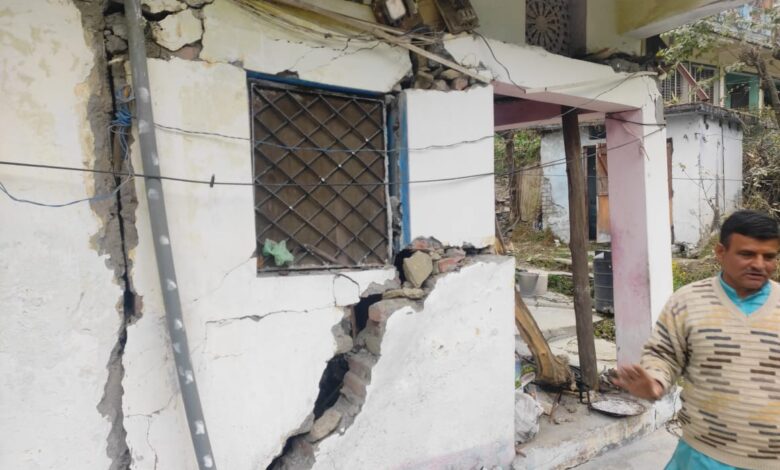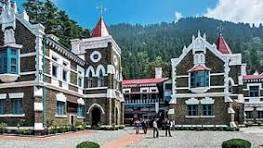Has NDMA any mandate to put a gag order on ISRO ?

Has NDMA any mandate to put a gag order on ISRO ?
By Rashme Sehgal
New Delhi, Feb 11
Does the National Disaster Management Authority (NDMA) have the mandate to issue a gag order on a premier scientific institution like the Indian Space Research Organisation (ISRO)?
So it appears when in mid- January NDMA warned the Hyderabad based National Remote Sensing Centre(NSRC), an arm of ISRO, not to release any information dealing with Joshimath. NSRC had in its report shown images taken from the Sentinel 1 satellite of the European Space Agency and from ISRO’s own Cartosat 28 satellite.
These images showed that the entire town of Joshimath had sunk up to 9 cm between April and November 2022 and between December 27 and January 4, it had sunk even more rapidly by as much as 5.4 cm. Instead of admitting to the seriousness of the situation and admitting to their own tardy response given that the state wing of NDMA should have been more alert about what was happening in this religious town as also in several other towns of Uttarakhand, NDMA chose instead to shoot the messenger.
It ordered that the eight premier scientific institutions that were presently studying the disaster that has engulfed Joshimath not to `interact with the media or share data on social media regarding the ground subsidence at Joshimath.’ These include IIT Roorkee, the National Geophysical Institute Hyderabad, National Institute of Hydrology Roorkee, Wadia Institute of Himalayan Geology, the Central Building Research Institute and a slew of institutions.
The Official Memorandum(OM) issued by NDMA claimed that data released on the subsidence of Joshimath was `only serving to create confusion not only among affected residents but also among citizens of the country.’ The scientific community are extremely upset by the OM issued by the NDMA obviously at the behest of the Ministry of Home Affairs which had chaired a meeting on this subject attended by the Minster of Home Affairs.
A leading scientist pointed out, ` The NDMA’s mandate is to coordinate response to natural and man-made disasters. Their own response to this calamity in Joshimath has been lackadaisical to say the least especially since these cracks first appeared three years ago and now seem to have spread to several other cities in Uttarakhand.”
How can it issue a diktat to ISRO which not only is India’s premier space agency but which has developed an international reputation as being one of the few space agencies in the world to successfully rockets to other planets as also to deploy a large fleet of satellites in space and also to successfully use cryogenic engines,’ the scientist wondered.
He further said, `Our scientific institutions are autonomous bodies. It is therefore surprising that none of the heads of these organizations or the heads of our six premier National Science Academies have chosen to speak out against this gag order.”
Dr CP Rajendran, adjunct professor at the National Institute of Advanced Studies said, ` The NDMA order is unprecedented. It is not the parental head of any of the eight organizations on which the gag order has been placed. But this( sort of thing) is happening all the time. The information that the Sentinel satellite put out was on the ISRO website.
Anybody could have downloaded it. There are any number of papers on this subject being brought out by scientists around the world.” Rajendran believes, `The main reason for this silent acquiescence is that scientific research depends largely on government funding. There is a fear of retaliation if they dare speak out. The government will release money to scientists willing to do research on subjects such as cow urine but things are looking very bad for those doing working on fundamental scientific research. Science must act as a bulwark against repressive viewpoints. Sadly, the government is using intimidation and surveillance to silence the community,’ he added.
Physicist Vikram Soni, emeritus professor at JNU who works in the field of public science also questions this diktat. `Is the government trying to say that science should not be used to benefit the public at large. After all science is being used to give warnings for cyclones and floods. Meteorological data is being used around the world. Obviously this can alarm people but that does not mean it should be stopped. Withholding of information can do tremendous harm. Do they want people to die? The Scientific information is used to inform people especially in case of an impending disaster,’ he pointed out.
Soni goes on to ask, `Information being provided by ISRO and NRSC is not classified data which is going to affect homeland security. The more scientific information people receive, the more informed people become. The government has got its facts all wrong.” Soni goes on to cite the example of how inadequate soil testing has been done in the Himalayas resulting in roads being built in an unscientific manner.
`The result is that roads are not stabilizing and today these hills are witness to more than 1000 landslides in a year. Instead of re-evaluating their developmental model, the governmental agencies are clamping down on those institutions involved in doing scientific research,’ he said.
Dr Ravi Chopra, heading the People’s Science Institute (PSI) has also emerged as a strong critic of the unscientific methodology being employed in several major construction projects being executed in the fragile ecology of the Himalayas. Paucity of funds is being felt across several scientific institution. In 2019, a premier organization such as the Tata Institute of Fundamental Research which depends on central government for financial support, was forced to hold back half the salary amount of all staff members and researchers in February 2019.
Geologist Prof Y Sundriyal with the HN Bahuguna University has come out strongly against this gag order maintaining both the central and state governments have over stretched their mandate by clamping down on scientific institutions. ` These kind of gag orders will destroy the scientific mood in the country and replace it by jingoism and superstition. Scientists must be allowed to function in freedom. In any case, in this age of satellites nothing remains hidden and what happens in one country is followed closely scientists belonging to other nations,’ said Sundriyal.
Last year geologists Dr Navin Juyal and Dr S P Sati visited Joshimath and did a preliminary survey of the land subsidence taking place there. These findings were submitted to the ‘Joshimath Bachao Sangarsh Samiti’. It was clear enough even then that Joshimath was sinking but it was left to ISRO to provide the exact details of the extent of the subsidence.
But the apprehension amongst some scientists and the public at large is that the government will end up twisting the findings of the different scientific bodies in order to give a clean chit to NTPC. Atul Sati, convenor of the JBSS is not taking matters lying down and points out they have taken samples of the water coming out of the breached acquifer close to the Tapovan Vishnugad hydroelectric power project being constructed by the NTPC and have sent it out for testing. `It is a matter of life and death for us and once we get the results, we too will go public on our findings,’ said Sati.
Meanwhile, the multi institutional team of experts from the Wadia Institute of Himalayan Geology,the Central Building Research Institute, the National Geophysical Research Institute, the Central Ground Water Board, the Geological Survey of India and the National Institute of Hydrology have submitted their preliminary report to the government. So far, NDMA and the central government have chosen to remain silent on what these findings are.
(Rashme Sehgal is an independent senior journalist.)






